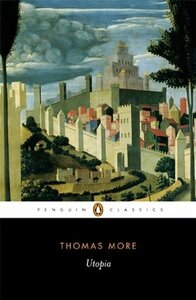You need to sign in or sign up before continuing.
Take a photo of a barcode or cover
challenging
reflective
slow-paced
Plot or Character Driven:
N/A
Strong character development:
N/A
Loveable characters:
N/A
Diverse cast of characters:
No
Flaws of characters a main focus:
Yes
I can only hope More was being satirical, because although he created something really interesting here, certain passages and ideas here repulsed me. Sure, nothing frivolous, everything utilitarian, beauty and probably art are superfluous, etc. Sure, all's for the public good; sure, family means nothing and if you want to learn a craft different from the one your family practices you can just be relocated to another family without any pain whatsoever. That all sounds pretty standard, but there were some really bizarre details here.
For example: The Utopians will fight war just to, you know, help fellow human beings out, because they're a swell, swell people. They will hire mercenaries to do it and these mercenaries -- the Venalians -- are, of course, awful human beings that the Utopians can only hope will be wiped off the face of the earth.
Or: Adultery is punishable by hard labor. An adulterer must separate from their spouse, unless their spouse loves them and wants to stay with them, in which case they're both sentenced to hard labor unless the Mayor graciously pardons both of them. What? The other things, at least they make sense within Utopia's internal, warped logic, but... In Utopia, you can actually be punished for being cheated on by your spouse, and wanting to forgive them?
The Utopians are, I suppose, the ideal people, but they're really holier-than-thou in a Mary Sue type way, which makes sense as Utopia is supposed to be the Mary Sue of places, right? The Utopians are, apparently, amazing at everything -- farming, warfare, sciences, languages -- but are supposed to be particularly moral, which gives them a rather condescending cast and only makes their oddities all the more distressing and annoying. They hate war! -- but if they want to go establish a colony somewhere, they'll try to win over the natives, and if they can't, it's perfectly okay to slaughter them because all land is communal, right? Those bums were just camping on the soil and not using it, and they didn't see reason when the Utopians tried to show them, and therefore killing them is actually the right thing to do!
Despite that, and lots more morally repulsive or downright strange ideas, Utopia was still fun to read. I would be more comforted if I could know for certain that More was being satirical, but perhaps that's part of the fun, and anyways, if I found out that More was wholly in earnest it would probably destroy my enjoyment of the book completely. So maybe this ambiguity is a good thing.
For example: The Utopians will fight war just to, you know, help fellow human beings out, because they're a swell, swell people. They will hire mercenaries to do it and these mercenaries -- the Venalians -- are, of course, awful human beings that the Utopians can only hope will be wiped off the face of the earth.
Or: Adultery is punishable by hard labor. An adulterer must separate from their spouse, unless their spouse loves them and wants to stay with them, in which case they're both sentenced to hard labor unless the Mayor graciously pardons both of them. What? The other things, at least they make sense within Utopia's internal, warped logic, but... In Utopia, you can actually be punished for being cheated on by your spouse, and wanting to forgive them?
The Utopians are, I suppose, the ideal people, but they're really holier-than-thou in a Mary Sue type way, which makes sense as Utopia is supposed to be the Mary Sue of places, right? The Utopians are, apparently, amazing at everything -- farming, warfare, sciences, languages -- but are supposed to be particularly moral, which gives them a rather condescending cast and only makes their oddities all the more distressing and annoying. They hate war! -- but if they want to go establish a colony somewhere, they'll try to win over the natives, and if they can't, it's perfectly okay to slaughter them because all land is communal, right? Those bums were just camping on the soil and not using it, and they didn't see reason when the Utopians tried to show them, and therefore killing them is actually the right thing to do!
Despite that, and lots more morally repulsive or downright strange ideas, Utopia was still fun to read. I would be more comforted if I could know for certain that More was being satirical, but perhaps that's part of the fun, and anyways, if I found out that More was wholly in earnest it would probably destroy my enjoyment of the book completely. So maybe this ambiguity is a good thing.
informative
reflective
fast-paced
hopeful
informative
reflective
Plot or Character Driven:
N/A
Strong character development:
N/A
Loveable characters:
Yes
Diverse cast of characters:
Complicated
Flaws of characters a main focus:
No
reflective
medium-paced
Plot or Character Driven:
N/A
Strong character development:
No
Loveable characters:
N/A
Diverse cast of characters:
N/A
Flaws of characters a main focus:
N/A

Finished reading: December 31st 2017
“Pride thinks it's own happiness shines the brighter by comparing it with the misfortunes of others.”
Spoiler

I've had this classic on my TBR pile for ages now, and to be honest I was a bit intimidated by the fact that Utopia was published that long ago. This kind of classics are not always easy to read, but thankfully the English translation I read was not difficult to read at all. Thomas More wrote Utopia originally in Latin back in 1516, and in it he reveals some both very interesting and puzzling ideas on what the ideal society would look like. I can't say I agree with everything he said, but every aspect of the Utopian society is well elaborated and shows exactly how things would work for the inhabitants of Utopia. The beginning of Utopia reads a bit slow, but as soon as the story starts elaborating the different aspects of Utopian life the pace picks up considerably. All in all quite an interesting read for those who are interested in philosophy and politics.
P.S. Find more of my reviews here.
I like this advice: Skim book I, and then dive into book II and let your imagination free.
challenging
informative
slow-paced
Plot or Character Driven:
N/A
Strong character development:
No
Loveable characters:
No
Diverse cast of characters:
No
Flaws of characters a main focus:
No
challenging
reflective
slow-paced
Plot or Character Driven:
N/A
Strong character development:
N/A
Loveable characters:
N/A
Diverse cast of characters:
N/A
Flaws of characters a main focus:
Complicated
challenging
mysterious
slow-paced





